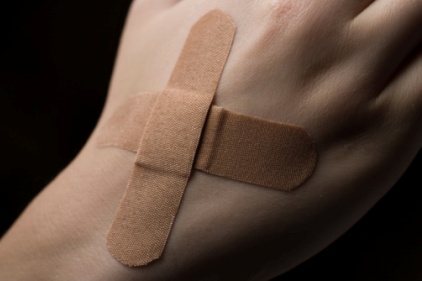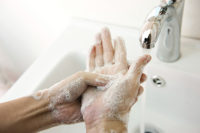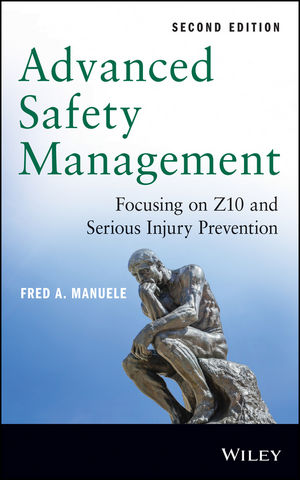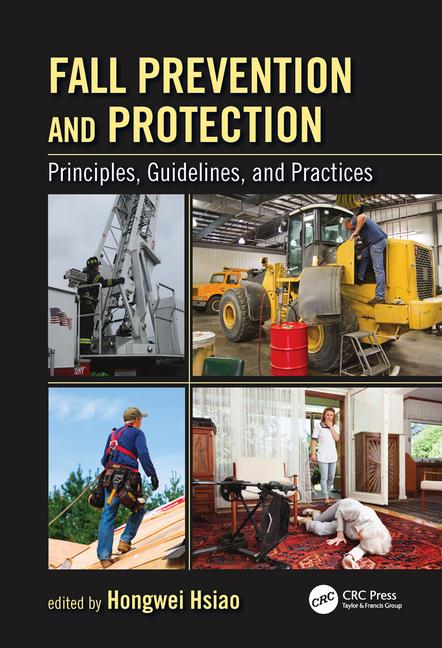Chemical hazards
Chemical substances may irritate the skin, causing redness, itching, eczema, inflammation, dryness and serious burns. Some chemical products are doubly dangerous: in addition to being irritants, they are toxic when absorbed by the body through the skin. Degreasers, metals, plant and animal oils, dyes, inks, cleaning solutions and many other chemical products can damage the skin and subcutaneous tissues of your hands.
A few prevention tips
· Keep containers correctly labeled and be sure to always read, understand and follow the manufacturer's directions.
· Protect your skin by wearing proper gloves for the substances being handled.
· Report any problem with a substance or protective clothing.
· Wash your skin well with soap and warm water or use special cleansers, especially after direct contact with a chemical substance and before smoking or eating.
· Don't wipe your hands with chemically contaminated rags.
· Use barrier creams when there is no other way to protect your hands. Since it is important to use the right cream, you should see a specialist. The wrong cream may encourage absorption of certain substances rather than protect you. Barrier creams must be reapplied after you wash your hands.
Risk of infection
Hands exposed to materials contaminated by microbes can become infected. For example, tetanus and hepatitis C are infections that can be transmitted through hand wounds. Check the date of your last tetanus immunization. Hepatitis C immunization is important for health care workers and laboratory workers.
A few prevention tips
· Always wash your hands thoroughly.
· Wear proper gloves to protect your hands.
· Use safe handling techniques.
· Always obtain first aid for every injury, no matter how minor.
Strains and sprains
Strains and sprains occur when the muscles and ligaments that hold the joints in place are bruised, pulled or torn. These injuries often occur when you lift heavy objects or try to break a sudden fall.
A few prevention tips
· Beware of broken floors and torn or curled rugs or mats. Report these hazards for repair.
· Use handrails on stairs.
· Never jump down from a platform, scaffold, loading dock or other height.
· Use ladders properly for climbing.
· When moving heavy or bulky things, use a lifting device or ask for help.
Fractures
Fractures occur in what are referred to as "hand traps", such as wheels, pulleys and rollers, or when the hand strikes a hard object.
A few prevention tips
· Keep your hands away from machines in operation.
· Position hands carefully so fingers won't get caught.
· Feed rotary or operating machines with a push stick.
Crush Injuries
Crush injuries damage deep tissues and bones. They occur when your hand is caught between two solid parts that strike each other, such as falling objects, drawers and doors.
A few prevention tips
· Always use the protective devices on machines.
· Be sure you can see what you are doing and don't take dangerous shortcuts to get the job done faster.
· When using bench-mounted machines, make sure they are securely fastened in place.
· Make sure that your gloves don't get caught in moving parts.
Abrasions
Abrasions and lacerations occur when skin is rubbed away by friction from belts, sanders, grinders and rough materials. Broken skin allows for easy absorption of toxic or infectious substances by the body.
A few prevention tips
· Do not remove protective devices from machines.
· Wear proper gloves for the job.
Cuts
Cuts can occur when you use dull cutting tools or handle sharp metals and other materials with jagged edges.
A few prevention tips
· Keep your hands and fingers away from cutting tools.
· Pass tools to other workers handle first.
· Store tools safely when not in use and replace worn out or broken tools.
· Use grips, suction cups or magnetic pads to help carry metal or glass sheeting.
· Wear proper gloves, for example, metal mesh gloves when cutting meat.
· Don't hold the workpiece in your hand while using a hand tool. Under pressure, the tool could slip and injure you. The piece should be on a flat surface and firmly secured.
Puncture Wounds
Puncture wounds occur when pointed objects or tools pierce the skin and deep tissues. For example, punctures can result from glass, fish hooks, thorns, animal bites or nails hidden in wood.
Note: Accidental injection of the contents of air guns is a far greater danger than most people realize. Though the injury may seem minor, the victim must be taken immediately to the hospital.
A few prevention tips
· Use adequate hand protection.
· Remove all debris and scrap materials from the work area.
· Watch for nails and other sharp objects when handling used lumber.
· Use the right tool for the job, and use it properly.
· Never use screwdrivers as levers, chisels or reamers, or to perform work for which they are not designed. Never carry screwdrivers in your pocket.
· Files should never be used without a handle because the sharp pointed tang can be driven into your hand.





